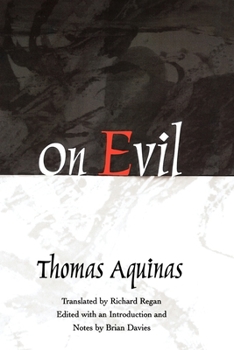On Evil
Select Format
Select Condition 
Book Overview
The De Malo represents some of Aquinas' most mature thinking on goodness, badness, and human agency. In it he examines the full range of questions associated with evil: its origin, its nature, its relation to good, and its compatibility with the existence of an omnipotent, benevolent God. This edition offers Richard Regan's new, clear readable English translation, based on the Leonine Commission's authoritative edition of the Latin text. Brian Davies has provided an extensive introduction and notes. (Please note: this edition does not include the Latin text).
Format:Paperback
Language:English
ISBN:0195091833
ISBN13:9780195091830
Release Date:March 2003
Publisher:Oxford University Press
Length:560 Pages
Weight:1.82 lbs.
Dimensions:1.2" x 6.1" x 9.4"
Customer Reviews
1 rating
Summon Your Demons
Published by Thriftbooks.com User , 15 years ago
It is a sad thing indeed, that the great Thomas Aquinas is the court theologian of the Roman Church. Those with an atheist bent, and who have never read a single line of Thomas's writings, point to his awful Summa Theologica, and brush him aside as a dullard and an adulterator of Aristotelianism. The truth is that Thomas was an excellent philosopher in his own right. Summa Theologica is not the best that he wrote. Dominique Chenu rightly pointed out that the Disputed Questions, and not the Summa, are to be considered the greatest among the writings of Thomas. And among the Disputed Questions, the one on hand, De Malo (On Evil), stands out as perhaps the very best. In this work, Thomas Aquinas offers us the most detailed anatomy of evil ever put down on paper. The only shortcoming of this work is that it is geared towards evil as an individual act, be it demonic or human. Thomas has nothing to say regarding the reality of social evil. But the latter perspective cannot be expected from a philosopher of the Middle Ages. Even so, those of our contemporaries who have the tenacity to study this brilliant treatise are likely to reap ample reward.





